Explore: Connections Between UMS and U-M Museum of Art
Visual and performing arts have a close relationship. We asked our partners and friends at UMMA (U-M Museum of Art) to link performances on the UMS season with visual art works that are part of the museum’s permanent collection.
Related performance: Tanya Tagaq in concert with Nanook of the North
February 6, 2016
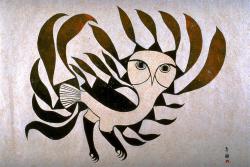 Artwork: Kenojuak Ashevak (Canadian, 1927-2013). Sun Owl, 1963. Stonecut print on paper. Gift of Mr. and Mrs. Eugene B. Power, 1964/2.103
Artwork: Kenojuak Ashevak (Canadian, 1927-2013). Sun Owl, 1963. Stonecut print on paper. Gift of Mr. and Mrs. Eugene B. Power, 1964/2.103
Like Tanya Tagaq, Kenojuak Ashevak was from Nunavut and her art was inspired by her Inuit experience. She often depicted animals from the Arctic such as this owl, but, also like Tagaq, she relies on her creativity and imagination. Ashevak explained that she drew as she thought, and so she produced spontaneous and improvisatory images.
Related performance: Camille A. Brown & Dancers: Black Girl — A Linguistic Play
February 13, 2016
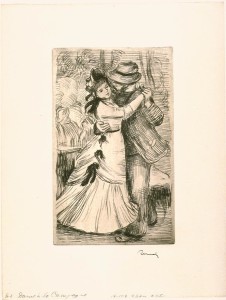 Artwork: Pierre Auguste Renoir (French, 1841-1919). Dance in the Country, c. 1890
Artwork: Pierre Auguste Renoir (French, 1841-1919). Dance in the Country, c. 1890
Soft-ground etching on paper. Museum Purchase, 1959/1.102
In Renoir’s beloved image of country dance we see an earlier century’s ritual of recreation. Although more restrained than contemporary dance, it represents social dance, one of the inspirations for choreographer Camille Brown’s work.
Related performance: Nufonia Must Fall
March 11-12, 2016
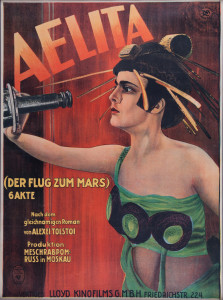 Artwork: P. Grasnick (n.d.). Aelita, 1924
Artwork: P. Grasnick (n.d.). Aelita, 1924
Lithograph on buff woven paper, laid down on canvas. Gift of James T. Van Loo, 2013/2.233
This poster is for the movie Aelita, which is often called the first Soviet science fiction film, created during the sometimes hope-filled beginnings of the Soviet Union. A mysterious radio message is beamed around the world, and among the engineers who receive it are Los, the hero of the film. Aelita is the daughter of Tuskub, the ruler of a totalitarian state on Mars. With a telescope, Aelita is able to watch Los who obsesses about being watched by her. He builds a spaceship and travels to Mars where he is thrown in prison, begins a proletarian uprising and experiences the confusion of reality and fantasy. While Nufonia Must Fall is no sci-fi film, it is based on a graphic novel of the same title, and viewers might find similarities between the genres.
Related performance: Gil Shaham Bach Six Solos
with original films by David Michalek
March 26, 2016
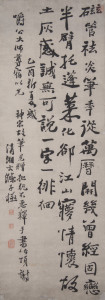 Artwork: Shitao (Shih-t’ao; Chinese, 1642-1707) Ode on a Wanli-era Imperial Brush Ink on paper, 1705. Museum purchase made possible by the Margaret Watson Parker Art Collection Fund, 1965/2.75.
Artwork: Shitao (Shih-t’ao; Chinese, 1642-1707) Ode on a Wanli-era Imperial Brush Ink on paper, 1705. Museum purchase made possible by the Margaret Watson Parker Art Collection Fund, 1965/2.75.
Taking an honored and beloved corpus of music from the past, Gil Shaham transforms its familiar beauty into a fresh, contemporary work of art. Similarly, Shitao receives a beautiful gift, a porcelain-handled calligraphy brush, from an earlier generation and uses it to write a poem and create a calligraphic masterpiece. The era and form are new but the inspiration is classic.
Related performance: Mariachi Vargas de Tecalitlán
April 1, 2016
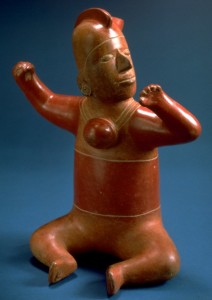 Artwork: Artist Unknown, Mexican, Colima Culture Seated Figure, c. 700 Terracotta Museum purchase made possible by a gift from Helmut Stern, 1983/1.355Artist Unknown, Mexican, Colima CultureSeated Figure, c. 700TerracottaMuseum purchase made possible by a gift from Helmut Stern, 1983/1.355
Artwork: Artist Unknown, Mexican, Colima Culture Seated Figure, c. 700 Terracotta Museum purchase made possible by a gift from Helmut Stern, 1983/1.355Artist Unknown, Mexican, Colima CultureSeated Figure, c. 700TerracottaMuseum purchase made possible by a gift from Helmut Stern, 1983/1.355
This lovely terracotta seated figure is an example of the native arts and culture celebrated by Mexican visual and musical artists. Mariachi Vargas de Tecalitlán transform a regional folk music into a world-class art form.
Related performance: Zafir: Musical Winds from North Africa to Andalucia
April 15, 2016
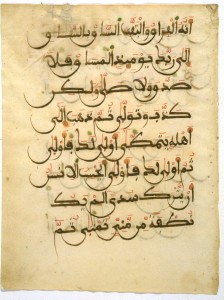 Artwork: Artist Unknown, North Africa Qur’an manuscript leaf in Maghribi script, 13th century Ink, red ochre, paper Museum Purchase, 1959/1.146
Artwork: Artist Unknown, North Africa Qur’an manuscript leaf in Maghribi script, 13th century Ink, red ochre, paper Museum Purchase, 1959/1.146
For Muslims, Arabic script, representing the language of the Qur’an, is a thing of sublime beauty. This page is written in a script called Maghribi, a variation of the earlier, angular, Kufic script. Maghribi features sweeping curves that loop across the page and was developed in North Africa and Spain. This Qur’an page combines traditions of the Middle East, Spain and North Africa as does the music of Simon Shaheen and Zafir.
Interested in more? Visit the U-M Museum of Art today.


